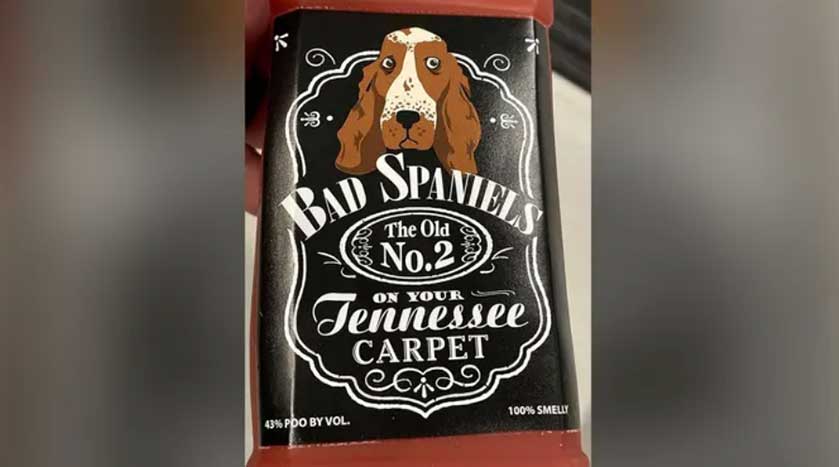The US Supreme Court debated whether a dog toy company potentially infringed upon the trademark of Jack Daniel’s by marketing a dog toy that parodies the distiller’s product. Kentucky-based Jack Daniel’s Properties sued Phoenix-based VIP Products for creating a vinyl chew toy named Bad Spaniels that looks like Jack Daniel’s whiskey bottle and with similar promotional texts.

Apart from the fact that VIP Product’s dog chew toy looks like Jack Daniel’s bottle, the dog toy company changed Jack Daniel’s “Old No. 7 Brand Tennessee Sour Mash Whiskey” written on its bottle to “the Old No. 2, on your Tennessee carpet” on its toy. Where Jack Daniel’s had specified that its whiskey has 40% alcohol volume, Bad Spaniels said the toy has 43% poo and 100% smelly.
The toy company, however, attached a tag stating that Bad Spaniels is “not affiliated with Jack Daniel Distillery.”
The Supreme Court debated whether VIP Products was merely exercising its rights under the First Amendment to create an expressive product, or if it actually violated Jack Daniel’s trademark. Justices considered the 1989 case where actress Ginger Rogers sued movie director Federico Fellini for using a trademark that customers would not easily pinpoint its source.
The case became a legal standard that was known as the Rogers test. A government lawyer asked justices of the apex court to jettison the Rogers test and apply a multifactor and rigorous test usually used to determine trademark infringement cases to evaluate whether potential customers could confuse the dog toy product as manufactured or approved by Jack Daniel’s.
Jack Daniel’s lawyer, Lisa S. Blatt, said potential customers would think the dog toy product emanated from Jack Daniel’s or that there was an affiliation. She contented that VIP Products ought to have sought permission, given the potentially confusing nature of its product with another company. Justice Sonia Sotomayor countered that “they don’t need permission to make a political joke. They don’t need permission to make a parody.”
Justice Samuel A. Alito Jr. seemed to agree with Sotomayor, stating that it is not possible for a right-thinking person to believe that Jack Daniel’s would approve of its trademark to be used for a dog toy – meaning that VIP did not infringe on the whiskey manufacturer’s trademark. He said Jack Daniel’s would never approve of the product if it was approached to grant permission, so there is no way a customer would think the product was affiliated with the whiskey company in any way.
The 9th US Circuit Court of Appeals in San Francisco had earlier ruled that the dog toy mimicked Jack Daniel’s trademark in a noncommercial and parodied manner, and so did not violate the trademark. Justice Elena Kagan did not agree that the toy was a noncommercial product. The case has been adjourned for a ruling in June.
